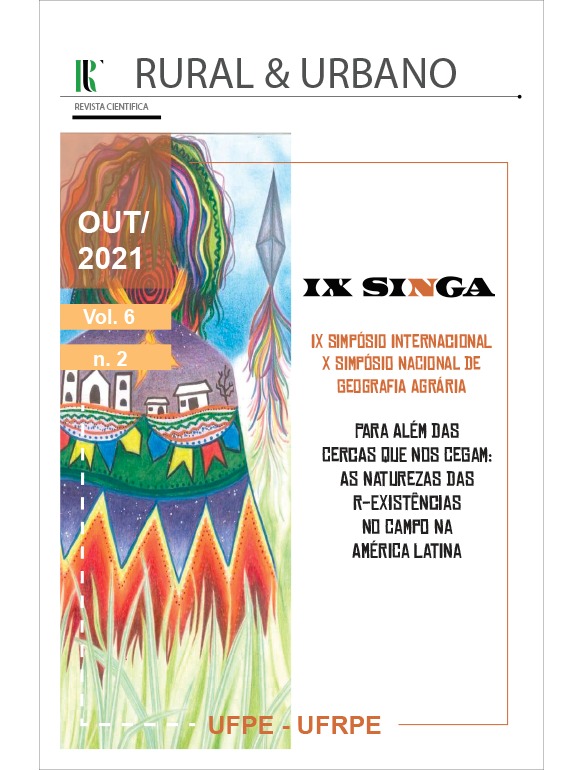Rice and cassava in the Baixada Maranhense microrregion: Contrasts in production and their socioeconomic impacts
DOI:
https://doi.org/10.51359/2525-6092.2021.251314Keywords:
family farming; rice; development; cassavaAbstract
Agricultural production in the micro-region of Baixada Maranhense is mostly made up of family farming and has more than three-thirds of its area devoted to the cultivation of rice and cassava, however, in recent years, contrasts and declines have been observed in the area and in the production of both crops. Thus, this article aims to analyze the socioeconomic impacts resulting from the contrast in the production of rice and cassava crops in the micro-region of Baixada Maranhense.The research was based on the historical and dialectical materialism method, in addition, the bibliography specialized in the subject was used and, with the quantitative approach, secondary data and tabulation software, making of maps and graphs were used. The results obtained show the Baixada Maranhense as the micro-region that concentrates the largest number of people employed in family farming and the largest production of crops related to self-sustainment in the state, and even so, the opportunities are currently reflected in the participation of small farmers in the new sales channels. Finally, there is evidence of the relative increase in production and area destined to the cultivation of cassava in relation to rice cultivation, as a result of problems with the limitation of arable land belonging to small farmers.
References
COSME, Claudemir Martins. Os governos do PT e os descaminhos com a questão agrária no Brasil: contribuições para o diálogo polêmico, necessário e imprescindível à classe trabalhadora. Rev. Pegada, v. 17, n. 1, p. 312-343, jul. 2016. Disponível em: <https://revista.fct.unesp.br/index.php/pegada/article/view/4467> (consulta: 10/07/2021).
GABOARDI JUNIOR, Alcides. A IMPORTÂNCIA DA PRODUÇÃONA AGRICULTURA FAMILIAR PARA A SEGURANÇA ALIMENTAR. In:2ª JORNADA QUESTÃO AGRÁRIA E DESENVOLVIMENTO, 2., 2013, Paraná. Anais... . Paraná: Ufpr, 2013. Disponível em: <http://www.jornadaquestaoagraria.ufpr.br/trabalhos/uploads/trabalho2ujornada.pdf>. (consulta: 27/07/2021).
GEHLEN, Ivaldo. Políticas públicas e desenvolvimento social rural. Rev. São Paulo Perspectivas, São Paulo, vol. 18, n. 2, abr./jun. 2004.Disponível em: <https://www.scielo.br/j/spp/a/fC3c7q6pWCFJdWTtdjgZTRs/abstract/?lang=pt> (consulta: 18/07/2019).
GIRARDI, Eduardo Paulon; FERNANDES, Bernardo Mançano. A luta pela terra e a política de assentamentos rurais no Brasil: a reforma agrária conservadora. Rev. Agrária, n. 8, p. 73-98, 2008. Disponível em: <https://www.revistas.usp.br/agraria/article/view/157> (consulta: 10/07/2021).
IBGE -INSTITUTO BRASILEIRO DE GEOGRAFIA E ESTATÍSTICA.IBGE Cidades. Disponível em:<https://cidades.ibge.gov.br/> (consulta: 05/07/2021).
IBGE -INSTITUTO BRASILEIRO DE GEOGRAFIA E ESTATÍSTICA. Censo 2010. Disponível em: <https://censo2010.ibge.gov.br/>(consulta: 10/07/2021).
IBGE -INSTITUTO BRASILEIRO DE GEOGRAFIA E ESTATÍSTICA. Produção Agrícola Municipal (PAM). Disponível em: <https://sidra.ibge.gov.br/pesquisa/pam/tabelas> (consulta: 10/07/2021).
IBGE -INSTITUTO BRASILEIRO DE GEOGRAFIA E ESTATÍSTICA. Regiões de Influência de Cidades de2018(REGIC). Rio de Janeiro: IBGE, 2020. Disponível em: <https://www.ibge.gov.br/apps/regic/> (consulta:15/07/2021).
IMESC –INSTITUTO MARANHENSE DE ESTUDOS SOCIOECONÔMICOS E CARTOGRÁFICOS.Disponível em: <http://imesc.ma.gov.br/portal/Home> (consulta: 05/07/2019).
JUNQUEIRA, Clarissa Pereira; LIMA, Jandir Ferrera.Políticas públicas para a agricultura familiar no Brasil. Semanade Ciências Sociais eHumanas, Londrina, v. 29, p. 159-176, jul/dez. 2008.Disponível em: <https://bibliotecadigital.mdh.gov.br/jspui/handle/192/207> (consulta: 12/07/2019).
MARX, Karl. O capital: crítica da economia política. 25 ed. Rio de Janeiro: Civilização Brasileira, 2008.
MESQUITA, Benjamin Alvino de Mesquita. O desenvolvimento desigual da agricultura: a dinâmica do agronegócio e da agricultura familiar. São Luís: EDUFMA, 2011.
PICOLOTTO, EvertonLazzaretti. Os atores da construção da categoria agricultura familiar no Brasil.Rev. Economia e Sociologia Rural, Brasília, v. 52, 2014.
PINHEIRO, José Carlos Durans. A realidade da mandioca no Maranhão. 2 ed. São Luís: Editora Pascal, 2019. SANTIAGO, CarlosMartins. Planeta arroz: Maranhão o despertar de um gigante.Disponível em: <https://www.planetaarroz.com.br/artigos/225/_Maranhao_o_despertar_de_um_gigante>(consulta: 15/07/2019).
SCHNEIDER, Sergio. A pluriatividade na agricultura familiar. 2 ed. Porto Alegre: Editora da UFRGS, 2009.
SODRÉ, Ronaldo Barros. O Maranhão Agrário: dinâmicas e conflitos territoriais. São Luís/MA, 2017. 211 f. Dissertação (Mestrado em Geografia). Programa de Pós-Graduação em Geografia, Natureza e Dinâmica do Espaço (PPGEO), Universidade Estadual do Maranhão. São Luís: 2017.
SOUSA, Igor Breno Barbosade. PROGRAMA NACIONAL DE ALIMENTAÇÃO ESCOLAR: Uma análise de dados sobre a estrutura, dinâmica e acesso no município de São Luís –MA de 2014 a 2018. 2020. 174 f. Dissertação (Mestrado) -Curso de Desenvolvimento Socioespacial e Regional, Universidade Estadual do Maranhão, São Luís, 2020
Downloads
Published
How to Cite
Issue
Section
License
Copyright (c) 2021 Thiago Ronyerisson Silva Costa, Igor Breno Barbosa de Souza, José Sampaio de Mattos Junior

This work is licensed under a Creative Commons Attribution-NonCommercial-ShareAlike 4.0 International License.
Autores que publicam nesta revista concordam com os seguintes termos:
a) Autores mantém os direitos autorais e concedem à revista o direito de primeira publicação, com o trabalho simultaneamente licenciado sob a Creative Commons Atribuição-Não Comercial-Compartilha Igual 4.0 Internacional  , que permite o compartilhamento do trabalho com reconhecimento da autoria e publicação inicial nesta revista.
, que permite o compartilhamento do trabalho com reconhecimento da autoria e publicação inicial nesta revista.
b) Autores têm autorização para assumir contratos adicionais separadamente, para distribuição não-exclusiva da versão do trabalho publicada nesta revista (ex.: publicar em repositório institucional ou como capítulo de livro), com reconhecimento de autoria e publicação inicial nesta revista.
c) Autores têm permissão e são estimulados a publicar e distribuir seu trabalho online (ex.: em repositórios institucionais ou na sua página pessoal) a qualquer ponto antes ou durante o processo editorial, já que isso pode gerar alterações produtivas, bem como aumentar o impacto e a citação do trabalho publicado.

